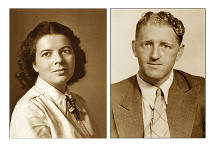














|
Rusty, writing on a review of "Death Is Part of The Process"
The Editor.
Although your reviewer of Hilda Bernstein's novel
"Death is Part of the Process" states that at the time of the books action -
circa 1961 - he was not yet born, he raises a number of interesting points
about its action and its characters. These seem, to one who was
born - and who participated in a small way in some of the events - to need
comment. It is not my intention to enter into discussion of the literary
merits of the book, or of M.F's review; readers can make up their own minds.
But the book is, as far as I know, the first-attempt to deal seriously (in
the form of fiction) with the beginning of armed struggle against the South
African state, with which the whole of the South African liberation movement
is now fully identified. It is important therefore, that its political
interpretation of people and events is not passed over too easily. For in
those events - and in the revelations of the characters of some of the
people who made a part of our history, there are important lessons to be
learnt, not least by those who did not participate in them but need to carry
their experiences into today's revolutionary activities.
One of the experiences of that time - doubtless being
repeated today - is that revolutionaries are not all perfect people,
flawless, heroic and incorruptible - much as we would like them to be. Some
were perhaps; more than one would find amongst any other cross section of
the population, because the high idealism and brotherhood of the
revolutionary cause rubs of; it inspires revolutionaries to selflessness and
self-sacrifice greatly different from the self-seeking "what's-in-it-for-me"
corruption of the society we live in. But still some revolutionaries are
less than perfect, and some are deeply flawed. It is as necessary to
understand that today as it was in 1961, when we had not had the opportunity
to learn from our experience. In 1961, some active participants in the
revolutionary struggle - like the Sipho of the book - did turn informer to
save their own skins, and some shepherded off many of their erstwhile
comrades to the jails and torture chambers. We have our heroes - many of
them; but we also have our Bruno Mtolo's and Bartholomew Hiapanes and Piet
Beylevelds. Today's revolutionaries dare not let revolutionary romanticism
blind them to the facts of what did happen; and what can surely happen
again.
Your reviewer would have liked the book to deal more
with the way decisions were made at the time in the upper ranks of the
movement, in the High Command; and about the participation, for example, of
Mandela and others. One day, no doubt, books about this - both fact and
fiction - will be written when it is no longer dangerous to our movement or
today's revolutionaries to disclose what must be still "classified"
information.
Hilda Bernstein's book deals not with those at the
very centre of the Umkhonto we Sizwe organisation, or at the centre of the
ANC or Communist Party; it deals with a group which starts on the fringes -
in a university-based "human rights committee" - which gets sucked into the
fringes of revolutionary action by a government clamp-down on a fairly
innocuous - and open - protest demonstration. This group of
non-revolutionary origins, is drawn closer and closer to the real
revolutionary core, driven by its own feelings of inadequacy and encouraged
by the revolutionary core which constantly needs technical aides, assistants
and allies in the "legitimate" world outside their own ranks.
Of these aides and allies, some are romantic
revolutionaries - like Pila, still with one foot in her bourgeois white
milieu and flawed consciousness, expressed - as your reviewer notes - in the
idea that being arrested somehow "earned" a badge of honour, and and in the
feeling that "I have done this for them". Others develop differently as they
move into underground activity - Dick into hopelessness and retreat under
the pressure of arrest; and his wife Marge, from an onlooker and outsider
into an activist of courage. In fact, as those who were there at the time
will know - our movement had experience of all these developments. The
revolutionary movement proved to be a magnet for many, a source of real
growth and strength for some that it attracted but also too fierce and
testing a challenge for others.
If I may take issue with your reviewer on one point,
it is on his appraisal of the short-lived sexual encounter between one of
the revolutionary core, Indris - black - and the emerging white activist
Marge. Your reviewer writes: "The novel seems to suggest that racial
consciousness (in Marge) could be alleviated if not destroyed by a casual
act of sexual intercourse." I think not. The sex - short lived though it is,
for reasons over which neither of the parties can have any control - is not
casual; it is deliberate and deeply felt. It reveals, I would suggest, not
that sex alleviates racial consciousness; but that in the context in which
it occurs, it is a watershed in the replacement of race consciousness with a
non-racial revolutionary consciousness.
Be that as it may, nothing can alter the fact that
this book represents the first serious attempt by someone inside our
movement to portray the reality of the beginnings of today's politics, not
through history but through historically accurate fiction. It needs to be
treated seriously both by those who were there at the time no less than by
those who were not and yet must pick up the traces. |

